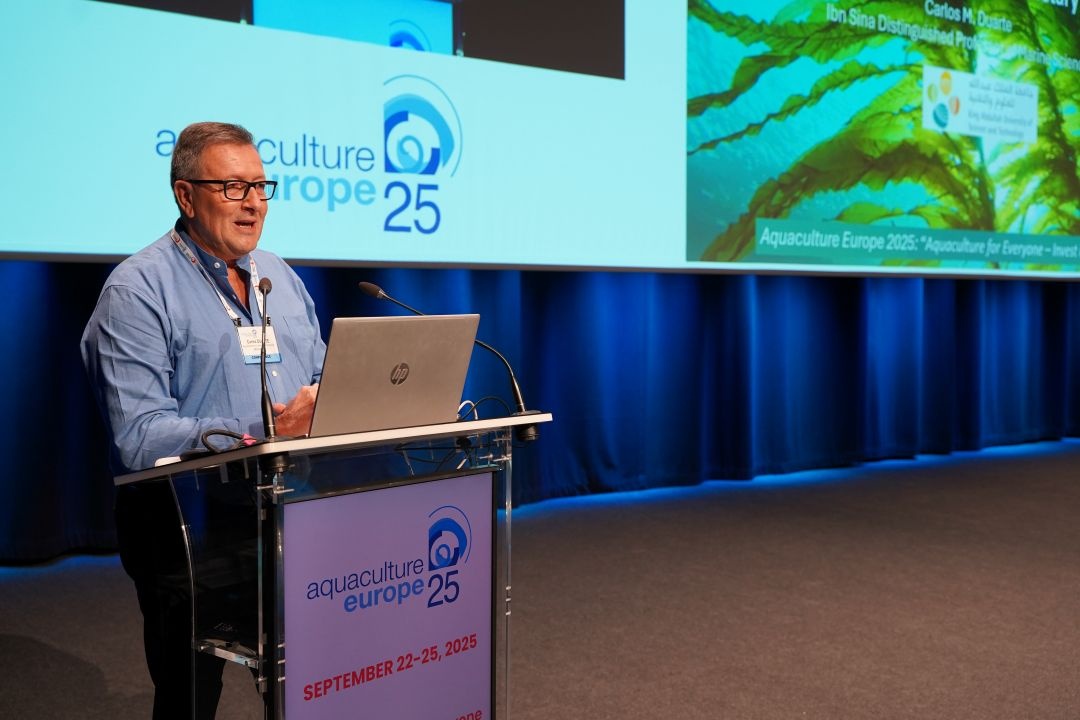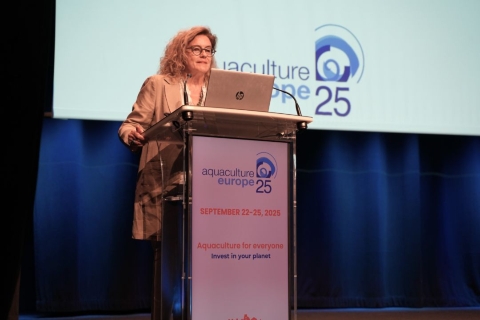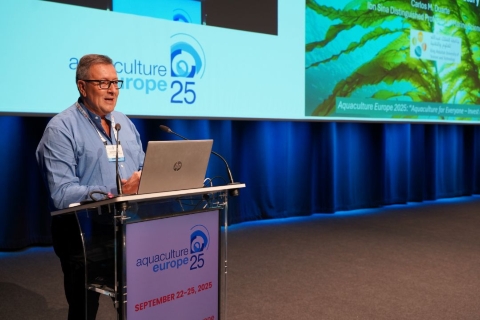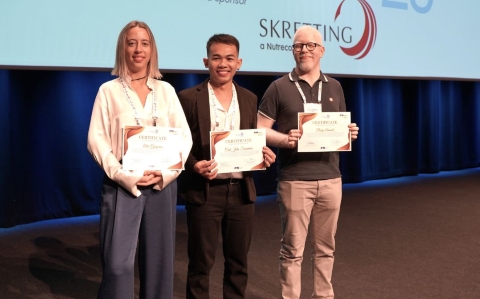
Oceanographer Carlos Duarte underlined in his address that aquaculture is not merely an option but an imperative if the world is to guarantee global food security. Speaking as a keynote at Aquaculture Europe 2025 in Valencia (AE25VAL), he explained that aquatic food are among the healthiest available and come with one of the lowest environmental footprints, far below that of other animal proteins. He also reminded delegates that fisheries peaked in the 1990s and have been in decline ever since, even as global demand for seafood continues to ries.
At present, more than 400 marine species have been domesticated, although the real potential stands at between 4,000 and 5,000. While aquaculture has ancient roots, Duarte stressed that it is essentially a twentieth and twenty-first century expanding at pace. He highlighted the remarkable feed conversion efficiency of farmed fish and shellfish, which require just 1.5 kilos of feed to gain one kilo in weight, compared with the eight kilos needed by cattle. The space used is also minimal: only around 4,000 km2 of ocean is currently occupied by aquaculture worldwide, set against a third of the Earth’s land surface given over to agriculture. Even if the present rate of growth continues, by 2050 aquaculture would use only 0.3% of the oceans.
Duarte warned, however, that the sector faces major challenges. Chief among them is its reliance on fishmeal and fish oil, with some 20 million tonnes of small pelagic fish harvested each year to feed farmed animals. If redirected for direct human consumption, this biomass could supply up to 8% of the recommended global intake of fish and prevent between half a million and three quarters of a million premature deaths annually.
Other challenges include competition for maritime space with renewable energy and marine protected areas, the environmental impact of certain farming practices, and the negative perceptions of aquaculture that persist in sections of the public.
To meet these challenges, Duarte called for a transition towards regenerative aquaculture, a model which does not simply reduce impacts but actively delivers net benefits to ecosystems and society. This approach, in his view, means cultivating low-trophic species such as seaweeds, filter feeders, herbivores and detritivores, diversifying feeds with plant-based ingredients, insects and microalgae, and promoting integrated multi-trophic system. He also emphasized the urgency of streamlining licensing procedures and recognizing the ecosystem services aquaculture provides, from carbon sequestration to water quality improvement and enhanced biodiversity.
Seaweed farming was highlighted as one of the sector’s most promising examples. In Europe it barely occupies a single square kilometer, compared with tens of thousands in Asia, yet the global sustainable potential is estimated at three million km2. Each hectare of seaweed is capable of sequestering between two and three tonnes of CO2 annually, and large-scale expansion could remove between 1.6 and 3 gigatonnes per year equivalent to 10% of the global mitigation effort required to meet climate goals. Duarte further pointed out that seaweed offers multiple opportunities beyond food, including bioplastics, cosmetics and biofuels, particularly in the aviation sector.
In the final part of his speech, Duarte distilled his conclusion into six key messages. He stressed the need to transform aquaculture into a sustainable, technology-driven and innovative industry, built on partnerships between countries with differing research capacities. He urged the sector to orient production towards seaweed and low-trophic species, capable of becoming genuine “blue superfoods”, both healthy for people and beneficial for the planet. He insisted that it is vital to acknowledge aquaculture’s positive contribution to ocean and human health by embedding payments for ecosystem services into regulatory and fiscal systems.
He also called for more effective management of public perception, highlighting the paradox that a third of the world’s land is given to agriculture while just 0.1% of the oceans is used for aquaculture, which is nevertheless often portrayed as problematic. Duarte argued for a regulatory framework that fosters, rather than hinders, the growth of the sector and its transition into the fourth industrial revolution.
Finally, he issued a humanistic appeal: to rebuild a global ethical foundation that prohibits the use of hunger as a weapon of war or instrument of genocide. Duarte concluded his address by urging regulators, researchers and industry alike to work towards transforming aquaculture into a regenerative industry capable of delivering environmental, social, economic and cultural benefits. “Aquaculture is the only viable path to feeding the world with healthy, affordable food that is compatible with the health of our oceans,” he said.



